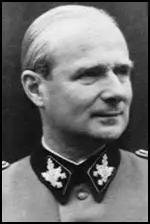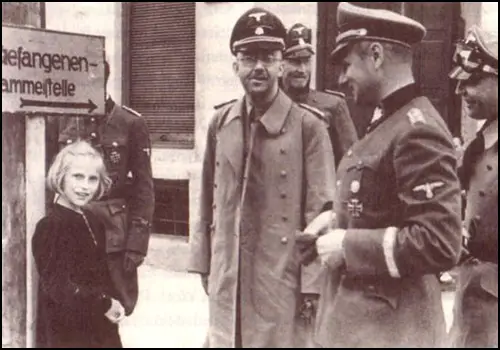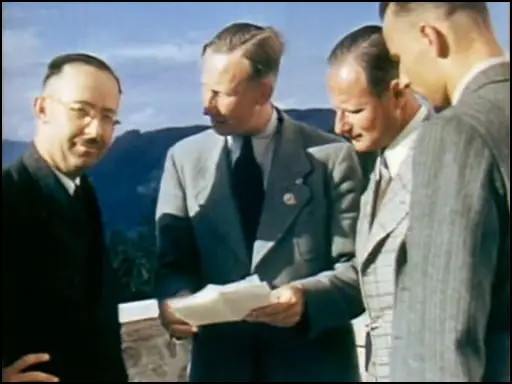Karl Wolff

Karl Wolff, the son of a district court judge, was born in Darmstadt, Germany, on 13th May 1900. Wolff was educated at a local Catholic school. At the age of sixteen Wolff joined the German Army and during the First World War served on the Western Front. In 1918 he was awarded the Iron Cross second class for bravery.
After the Armistice, he joined the Hesse Infantry Regiment with the intention of making the army his career. However, he was demobilised in 1920 as a result of the Treaty of Versailles, which reduced the strength of the German military forces. Wolff now became a banker in Frankfurt.
Wolff married Frieda von Roemheld in 1923. The couple moved to Munich, where Wolff worked for Deutsche Bank. As a result of the economic recession Wolff lost his job and in July 1925 he started his own public relations company. Wolff joined the National Socialist German Workers Party (NSDAP) in July 1931. In October he attempted to join the Sturmabteilung (SA) but was told "a big blond fellow like you should join the SS." Wolff took their advice and joined the Schutzstaffel (SS). He later recalled what was on his enrolment form: "I undertake to commit myself to the idea of Adolf Hitler, to maintain strictest Party discipline and to carry out the orders of the Reichsfuhrer of the Schutzstaffeln and the Party leadership conscientiously. I am German, of Aryan descent, belong to no freemasons' lodge and no secret society and promise to support the movement with all my powers."
Karl Wolff was commissioned as an SS-Sturmführer in February 1932. Wolff met Heinrich Himmler three months later during a course at the Reich Leadership School in Munich: "My first impression of Himmler was a great disappointment. I was considerably taller than him and had already been awarded the Iron Cross first and second class, and I had been an officer in one of the best and oldest regiments of the German Army - the Hessian Lifeguard Infantry Regiment in Darmstadt. On the other hand Himmler had no war decorations and had nothing in common with the front soldier; his whole bearing was rather sly and unmilitary, but he was very well read and tried to engage our interest with his acquired knowledge, and to enthuse us with the tasks of the SS."
Adolf Hitler obtained power in January 1933. Wolff now became a full-time political party member and was promoted to SS-Captain to serve as SS military liaison officer to the German Army. On 8th March 1933 he became a member of the Reichstag. On 15th June 1933, Heinrich Himmler appointed him as his Chief of Staff. It has been claimed that the reason for this was that Himmler wanted to please senior officers in the German Army. Others have suggested that it was his links with bankers and industrialists that was important. By 1937 he was an SS-Gruppenführer which placed him third in command of the entire SS (after Heinrich Himmler and Reinhard Heydrich).

Peter Padfield, the author of Himmler: Reichsfuhrer S.S. (1991) has argued: "This other face of the SS, reassuringly reasonable, intelligent but realistic, socially ultra-acceptable, was epitomised by Himmler's new adjutant, Karl Wolff. Like Heydrich he conformed closely to the Aryan ideal, six feet tall, blond hair, blue eyes with a high enough forehead to give his face the required length. He was six months older than Himmler, and had the advantage of having served a year at the front where he had won promotion and the Iron Cross 1st and 2nd class for bravery and zeal. His father had been a director of the district court in Darmstadt, thus a member of the haute bourgeoisie, and Wolff had attended the most socially acceptable Gymnasium in the city." Adrian Weale, the author of The SS: A New History (2010) described Wolff as "a dapper, well-spoken banker."
By 1937 he was an SS-Gruppenführer and considered third in command of the entire SS (after Himmler and Reinhard Heydrich). Wolff became and SS Liaison Officer to Adolf Hitler. In August 1941, Wolff and Himmler observed a mass execution near Minsk, that had been organised by Arthur Nebe. According to Wolff, Himmler noticed a tall, blond, blue-eyed man of about twenty whom he engaged in conversation. Himmler asked the man if both his parents were Jews. When he replied "Yes" he followed up with "Do you have any ancestors who were not Jews?" When the man said "No" he replied: "Then I can't help you."
Standing close to the pit, Himmler became increasingly distressed as the shooting commenced. According to Wolff: "After many volleys, I could see that Himmler was trembling. He ran his hand across his face and swayed... His face was almost green... He immediately threw up." Himmler complained that "a piece of brain just splattered in my face". After the killing was over, Himmler made a speech to the men in which he told them to "see it through". Wolff claims that Himmler told Nebe to "devise a less gruesome means of mass execution than simply shooting people."

During the Second World War he was involved in transporting Jews to concentration camps. In a letter dated 13th August 1942 to the deputy Reich Minister of Transport Dr. Albert Ganzenmüller: "I notice with particular pleasure your report that for 14 days a train has been going daily with members of the chosen people to Treblinka... I've made contact with the participating agencies, so that a smooth implementation of the entire action is ensured.”
Wolff became a full SS-Obergruppenführer in 1942. The following year Adolf Hitler assigned Wolff an SS adjutant to Benito Mussolini and his Italian Government. Hitler also personally granting him the equivalent General's rank in the Waffen-SS. When Italy surrendered to the Allies in February 1943, Wolff served as the Military Governor of northern Italy. During this period he divorced Frieda von Roemheld and married Countess Bernsdorff.
Karl Wolff later claimed that on 13th September, 1943, he was summoned to a meeting with Hitler: "I have a special mission for you, Wolff. It will be your duty not to discuss it with anyone before I give you permission to do so. Only Reichsfuhrer (Himmler) knows about it ... I want you and your troops to occupy Vatican City as soon as possible, secure its files and art treasures, and take the Pope and Curia to the north. I do not want him to fall into the hands of the Allies or to be under their political pressure and influence. The Vatican is already a nest of spies and a center of anti-National Socialist propaganda." Wolff did not carry out this order but he did remove important art treasures from Monte Cassino.
By the end of 1944 Wolff was acting military commander of Italy. Wolff agreed with Heinrich Himmler that it was futile to continue the war. In February 1945, Wolff made contact with Allen W. Dulles, head of the Office of Strategic Services in Switzerland. Wolff met Dulles in Lucerne on 8th March, 1945. Wolff negotiated the surrender of all German forces in Italy and signed the agreement on 2nd May, 1945.
Wolff was arrested on 13th May 1945. During the Nuremberg Trials, Wolff was allowed to escape prosecution by providing evidence against fellow members of the National Socialist German Workers Party (NSDAP). Wolff was sentenced in November 1948 to five years' imprisonment due to his membership in the SS. Seven months later his sentence was reduced to four years and he was released. He now successfully built up his public relations company. It has been claimed that during this period he worked for the Central Intelligence Agency (CIA).
In 1962 during the trial of Adolf Eichmann, evidence was provided to show that Wolff had organised the deportation of Jews to extermination camps while in Italy in 1944. Wolff was again tried in West Germany and in 1964 was convicted of deporting 300,000 Jews to the Treblinka and Auschwitz and the massacre of Italian Partisans in Belarus. Sentenced to 15 years' imprisonment in Straubing, Wolff served only part of his sentence and was released in 1969 due to ill health.
Over the next fifteen years Wolff lectured on the internal workings of the Schutzstaffel (SS) and his relationship with leading figures in the Nazi Party including Adolf Hitler, Heinrich Himmler and Reinhard Heydrich. He also appeared in several television documentaries such as The World At War.
Karl Wolff died in a hospital in Rosenheim on 17th July 1984.
Primary Sources
(1) Karl Wolff, interviewed by Andrew Mollo (1981)
My first impression of Himmler was a great disappointment. I was considerably taller than him and had already been awarded the Iron Cross first andd second class, and I had been an officer in one of the best and oldest regiments of the German Army - the Hessian Lifeguard Infantry Regiment in Darmstadt. On the other hand Himmler had no war decorations and had nothing in common with the front soldier; his whole bearing was rather sly and unmilitary, but he was very well read and tried to engage our interest with his acquired knowledge, and to enthuse us with the tasks of the SS....
They (other members of the SS) were deeply disappointed at losing the war, and the ensuing consequences which on the basis of the so-called "war guilt lie" held Germany to be the only guilty party. They were very dissatisfied with the Weimar Republic which did nothing to refute this lie, but on the contrary seemed to be completely acquiescent. They felt, quite rightly, that their own economic future, and that of their families, depended on that attitude being changed, and that it is why the majority of them joined, like myself, in an honorary capacity. With the exception of a few senior leaders we didn't receive any payment, nor were we compensated for loss of earnings incurred in travelling to meetings. They were idealists.
(2) Peter Padfield, Himmler: Reichsfuhrer S.S. (1991)
This other face of the SS, reassuringly reasonable, intelligent but realistic, socially ultra-acceptable, was epitomised by Himmler's new adjutant, Karl Wolff. Like Heydrich he conformed closely to the Aryan ideal, six feet tall, blond hair, blue eyes with a high enough forehead to give his face the required length. He was six months older than Himmler, and had the advantage of having served a year at the front where he had won promotion and the Iron Cross 1st and 2nd class for bravery and zeal. His father had been a director of the district court in Darmstadt, thus a member of the haute bourgeoisie, and Wolff had attended the most socially acceptable Gymnasium in the city. His war service had been with the exclusive Hessian Guard-Infantry regiment 115 led by the Grand Duke of Hessen-Darmstadt in person. Demobilised after the war, Wolff had taken a variety of bank and commercial jobs, married into a good family and gravitated to Munich as the nationalist mood boiled up just before Hitler's putsch. There in 1924, at a time when Himmler was despairing and unemployed, Wolff's agreeable personality had won him a post in a branch of a Hamburg advertising company and he performed so well that he was soon head of the branch. Within a year he had formed his own advertising firm, and it was only when this ran into trouble in the economic crises of 1931 that he had taken himself to the Brown House and signed an enrolment form for the SS: "I undertake to commit myself to the idea of Adolf Hitler, to maintain strictest Party discipline and to carry out the orders of the Reichsfuhrer of the Schutzstaffeln and the Party leadership conscientiously. I am German, of Aryan descent, belong to no freemasons' lodge and no secret society and promise to support the movement with all my powers."
The form passed up the chain of officials in the Reichsfuhrung, arriving on Himmler's desk some three weeks later, where the photograph attached was scrutinised through the pince-nez for non-Aryan blemishes in the features - Himmler claimed that all photographs were so examined - and sent out, approved, the same day.
Such was the man with the bearing of a soldier, the easy manners of an assured background, a naturally agreeable, persuasive personality - and with a National Socialist Weltanschauung soon grafted on to his nationalist outlook by the SS officer school - who, less than two years later, Himmler chose for his closest aide. It has been said that Himmler wanted to woo the Army at the time, and picked Wolff for the purpose, but Wolff was an asset in any company Himmler wished to impress, and did as well with the "Friends' Circle" of bankers and industrialists who donated to SS funds as with the officers of the Reichswehr or Land or Reich officials, or indeed SS or SA officers with proposals or quarrels. He was both reasonable persuader and emollient, and attempted to shield his chief as much as he could from the consequences of the immense responsibilities he was taking on. Heydrich was the fearful face of the Reichsfuhrer-SS, Wolff his "public relations" face. Himmler used both for his take-over of the regional Political Police. At the same time, by creating a rivalry between these two very different but most capable men, he sharpened their zeal and attachment to him, and safeguarded his own power position.
The picture of the unsoldierly, bespectacled Himmler, "to outward appearance a grotesque caricature of his own laws, norms and ideals", flanked by two such specimens of Aryan manhood and evidently compelling their devotion is something which has intrigued all commentators. And it was not only these two; there were a host of other blond, Nordic men from every background who looked up to him.
